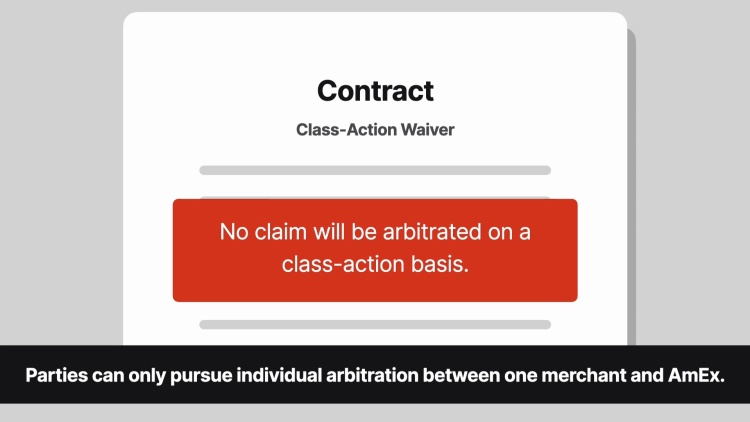American Express Co. v. Italian Colors Restaurant
United States Supreme Court
570 U.S. 228 (2013)
- Written by Serena Lipski, JD
Facts
Italian Colors Restaurant, along with several other merchants (the merchants) (respondents), accept American Express Cards. To accept American Express cards, the merchants must sign an agreement with American Express setting the fees that American Express collects from the merchants for each American Express transaction and prohibiting class arbitration. The merchants filed a class-action suit in a federal district court against American Express Co. (American Express) (petitioners) under federal antitrust laws, claiming American Express uses its monopoly power to force merchants’ agreement to higher fees than competing credit-card companies charge. American Express moved to compel the merchants to individually arbitrate their claims under the Federal Arbitration Act (FAA) based on their agreement’s arbitration clause. The merchants opposed the motion, arguing that the fees for an expert witness necessary to prove their claims would vastly outnumber their potential individual damages, making their claims too costly to arbitrate on an individual basis. The trial court granted American Express’s motion to compel and dismissed the case. On the merchants’ appeal, the court of appeals reversed the district court’s order, holding the arbitration clause was unenforceable because of the prohibitive cost to individually. This Court granted certiorari, vacated the court of appeals judgment, and remanded the case for further consideration under a newly decided case, Stolt-Nielsen S.A. v. Animal Feeds Int’l Corp. Stolt-Nielsen held that a party can only be compelled to class arbitration if it has agreed to do so. The court of appeals held that its ruling was unchanged by Stolt-Nielsen, but then reconsidered its decision in light of another newly decided United States Supreme Court case, AT&T Mobility LLC v. Concepcion. The court of appeals held that AT&T Mobility did not apply because it addressed preemption. The court then again returned to its earlier ruling, again reversing the district court’s holding.
Rule of Law
Issue
Holding and Reasoning (Scalia, J.)
Concurrence (Thomas, J.)
Dissent (Kagan, J.)
What to do next…
Here's why 904,000 law students have relied on our case briefs:
- Written by law professors and practitioners, not other law students. 47,100 briefs, keyed to 995 casebooks. Top-notch customer support.
- The right amount of information, includes the facts, issues, rule of law, holding and reasoning, and any concurrences and dissents.
- Access in your classes, works on your mobile and tablet. Massive library of related video lessons and high quality multiple-choice questions.
- Easy to use, uniform format for every case brief. Written in plain English, not in legalese. Our briefs summarize and simplify; they don’t just repeat the court’s language.





